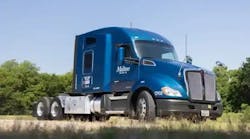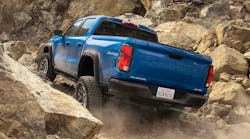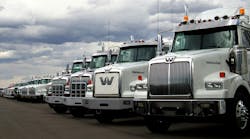It's common knowledge in the beverage industry that beer and wine must be stored at proper temperatures in order to retain their best taste and appearance.
Mercury Warehouse & Delivery, a subsidiary of Beverage Distributors Co., Aurora, CO, has taken steps to ensure its cargo gets delivered at optimum temps. The company distributes beer, wine and liquor throughout the state, and is the exclusive distribution agent in Colorado for New Belgium Brewing, its largest customer.
John Slater, transportation manager, says temperatures in Colorado can range from very hot to well below zero, depending on the time of year and where the trucks are going. In fact, it's not unusual for temps to go as low as -20 F in some of the ski resorts and other mountainous areas.
To eliminate the risk of product deterioration, Mercury converted its fleet of dry freight vans to 100% refrigeration. Newer vehicles in the fleet were modified to include thicker insulation in the walls and new refrigeration units from Carrier Transicold, while older equipment was replaced with new refrigerated bodies.
Slater notes the fleet was spec'd with Carrier Transicold Supra 644 units, which are large enough to allow beer and wine to be kept cool in the trucks overnight when necessary, and capable of heating the trailers when needed as well. “We pre-set the refrigeration units to 44 degrees,” he explains. “They then operate in stop-start mode to protect the product right through to delivery.”
The conversion covered Mercury's entire fleet of 55 route trucks and 10 trailers. Coinciding with the fleet conversion, the beverage distributor also added 9,600 sq. ft. of temperature-controlled space to its 208,000-sq.-ft. distribution center. Slater says an additional 10,000 sq. ft. of refrigerated space is currently being built explicitly for storing wine. The company expects to increase sales and deliveries now that it can keep keeping wines cool right up until the time they are delivered to the end-customer.
Mercury's fleet consists of 5 Kenworth T800 tractors, 10 Kenworth T800 tandem-axle straight trucks, 36 Kenworth T300 single-axle trucks and 4 International 4300 single-axle straight trucks. All vehicles are on full-service leases.
“In addition to being entirely refrigerated, what's unique about our fleet is that we spec shorter trailers than most other delivery operations. Our product is so heavy we need to reduce vehicle weight wherever we can in order to increase payload,” Slater explains.
Mercury specs 24-ft. pup trailers for its doubles operations, rather than more conventional 28-ft units. They are just 12-ft., 6-in. high and 96-in. wide, which reduces weight even more. The fleet also uses 40-ft. refrigerated trailers, not the more common 48- and 53-footers.
The T300 single-axle straight trucks are spec'd at 33,000-lb. GVW to accommodate the heavy load. They are fitted with 18-ft. Morgan bodies and have Cat 3126 engines rated at 250 hp., as well as automatic transmissions. For longer or higher volume routes, the tandem-axle T800 trucks are spec'd with 22-ft. Morgan bodies, Cummins M11 engines rated at 305 hp., and 10-speed Eaton Fuller transmissions.
“We're not your typical beverage distributor,” Slater reports. “Rather than side-loading product, we use high quality ramps (Roll-o-Matic Road Warrior ramps) to load everything from the rear of the truck or trailer. We also mix products, carrying wine and liquor as well as beer.”
Mercury's customers include any retail outlet that's licensed to sell liquor, beer and wine, such as restaurants, liquor stores, bars, hotels, and airline lounges.


